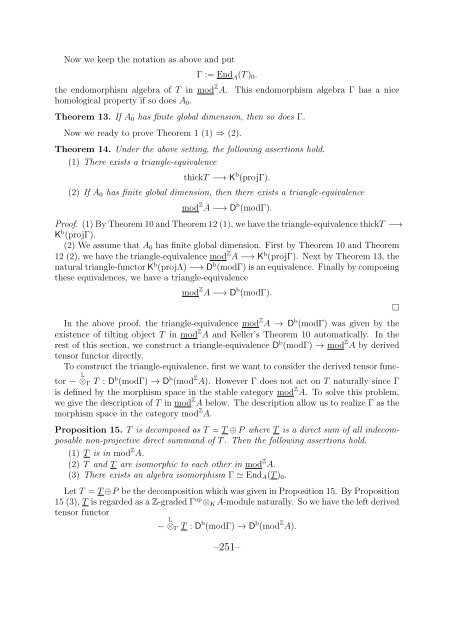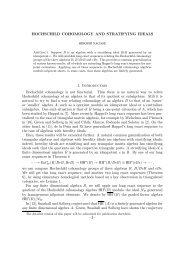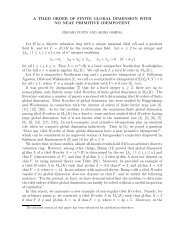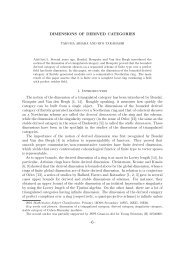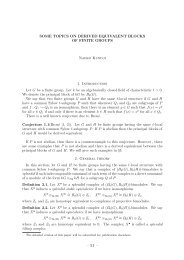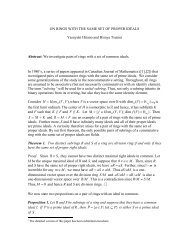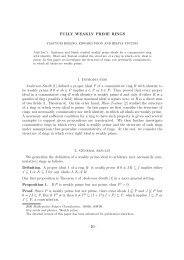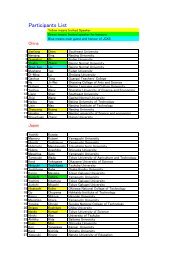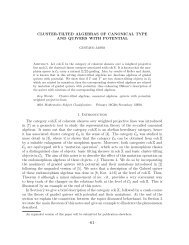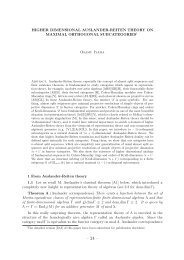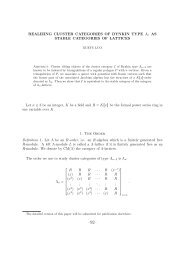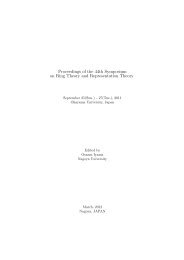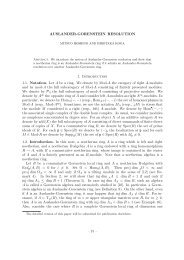Proceedings of the 44th Symposium on Ring Theory and ...
Proceedings of the 44th Symposium on Ring Theory and ...
Proceedings of the 44th Symposium on Ring Theory and ...
Create successful ePaper yourself
Turn your PDF publications into a flip-book with our unique Google optimized e-Paper software.
Now we keep <str<strong>on</strong>g>the</str<strong>on</strong>g> notati<strong>on</strong> as above <strong>and</strong> put<br />
Γ := End A (T ) 0 .<br />
<str<strong>on</strong>g>the</str<strong>on</strong>g> endomorphism algebra <str<strong>on</strong>g>of</str<strong>on</strong>g> T in mod Z A.<br />
homological property if so does A 0 .<br />
Theorem 13. If A 0 has finite global dimensi<strong>on</strong>, <str<strong>on</strong>g>the</str<strong>on</strong>g>n so does Γ.<br />
Now we ready to prove Theorem 1 (1) ⇒ (2).<br />
This endomorphism algebra Γ has a nice<br />
Theorem 14. Under <str<strong>on</strong>g>the</str<strong>on</strong>g> above setting, <str<strong>on</strong>g>the</str<strong>on</strong>g> following asserti<strong>on</strong>s hold.<br />
(1) There exists a triangle-equivalence<br />
thickT −→ K b (projΓ).<br />
(2) If A 0 has finite global dimensi<strong>on</strong>, <str<strong>on</strong>g>the</str<strong>on</strong>g>n <str<strong>on</strong>g>the</str<strong>on</strong>g>re exists a triangle-equivalence<br />
mod Z A −→ D b (modΓ).<br />
Pro<str<strong>on</strong>g>of</str<strong>on</strong>g>. (1) By Theorem 10 <strong>and</strong> Theorem 12 (1), we have <str<strong>on</strong>g>the</str<strong>on</strong>g> triangle-equivalence thickT −→<br />
K b (projΓ).<br />
(2) We assume that A 0 has finite global dimensi<strong>on</strong>. First by Theorem 10 <strong>and</strong> Theorem<br />
12 (2), we have <str<strong>on</strong>g>the</str<strong>on</strong>g> triangle-equivalence mod Z A −→ K b (projΓ). Next by Theorem 13, <str<strong>on</strong>g>the</str<strong>on</strong>g><br />
natural triangle-functor K b (projΛ) −→ D b (modΓ) is an equivalence. Finally by composing<br />
<str<strong>on</strong>g>the</str<strong>on</strong>g>se equivalences, we have a triangle-equivalence<br />
mod Z A −→ D b (modΓ).<br />
In <str<strong>on</strong>g>the</str<strong>on</strong>g> above pro<str<strong>on</strong>g>of</str<strong>on</strong>g>, <str<strong>on</strong>g>the</str<strong>on</strong>g> triangle-equivalence mod Z A → D b (modΓ) was given by <str<strong>on</strong>g>the</str<strong>on</strong>g><br />
existence <str<strong>on</strong>g>of</str<strong>on</strong>g> tilting object T in mod Z A <strong>and</strong> Keller’s Theorem 10 automatically. In <str<strong>on</strong>g>the</str<strong>on</strong>g><br />
rest <str<strong>on</strong>g>of</str<strong>on</strong>g> this secti<strong>on</strong>, we c<strong>on</strong>struct a triangle-equivalence D b (modΓ) → mod Z A by derived<br />
tensor functor directly.<br />
To c<strong>on</strong>struct <str<strong>on</strong>g>the</str<strong>on</strong>g> triangle-equivalence, first we want to c<strong>on</strong>sider <str<strong>on</strong>g>the</str<strong>on</strong>g> derived tensor functor<br />
− L ⊗ Γ T : D b (modΓ) → D b (mod Z A). However Γ does not act <strong>on</strong> T naturally since Γ<br />
is defined by <str<strong>on</strong>g>the</str<strong>on</strong>g> morphism space in <str<strong>on</strong>g>the</str<strong>on</strong>g> stable category mod Z A. To solve this problem,<br />
we give <str<strong>on</strong>g>the</str<strong>on</strong>g> descripti<strong>on</strong> <str<strong>on</strong>g>of</str<strong>on</strong>g> T in mod Z A below. The descripti<strong>on</strong> allow us to realize Γ as <str<strong>on</strong>g>the</str<strong>on</strong>g><br />
morphism space in <str<strong>on</strong>g>the</str<strong>on</strong>g> category mod Z A.<br />
Propositi<strong>on</strong> 15. T is decomposed as T = T ⊕ P where T is a direct sum <str<strong>on</strong>g>of</str<strong>on</strong>g> all indecomposable<br />
n<strong>on</strong>-projective direct summ<strong>and</strong> <str<strong>on</strong>g>of</str<strong>on</strong>g> T . Then <str<strong>on</strong>g>the</str<strong>on</strong>g> following asserti<strong>on</strong>s hold.<br />
(1) T is in mod Z A.<br />
(2) T <strong>and</strong> T are isomorphic to each o<str<strong>on</strong>g>the</str<strong>on</strong>g>r in mod Z A.<br />
(3) There exists an algebra isomorphism Γ ≃ End A (T ) 0 .<br />
Let T = T ⊕P be <str<strong>on</strong>g>the</str<strong>on</strong>g> decompositi<strong>on</strong> which was given in Propositi<strong>on</strong> 15. By Propositi<strong>on</strong><br />
15 (3), T is regarded as a Z-graded Γ op ⊗ K A-module naturally. So we have <str<strong>on</strong>g>the</str<strong>on</strong>g> left derived<br />
tensor functor<br />
− L ⊗ Γ T : D b (modΓ) → D b (mod Z A).<br />
–251–<br />
□


